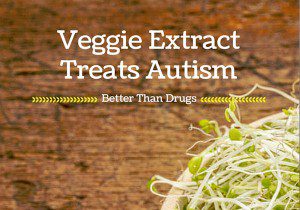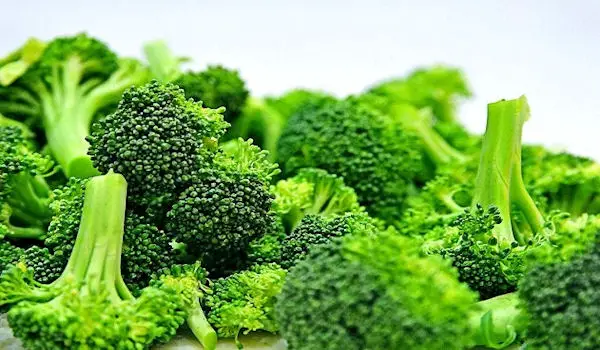By Sayer Ji
Contributing Writer for Wake Up World
The CDC says there is no treatment for autism, but this vegetable extract significantly improved the condition in a recent clinical trial.
Presently, autism spectrum disorder (ASD) is considered a condition with no known conventional treatment. According to the CDC: “There are no medications that can cure ASD or treat the core symptoms.” [1] With a prevalence rate in the U.S. estimated to be 1 in every 68 children [2], a growing number of families are actively searching for safe, affordable and effective interventions.
Thankfully, and despite the failings of pharmaceutical-based medicine, there are natural interventions that have been studied and appear to hold great promise. For instance, GreenMedInfo has indexed research from the National Library of Medicine on over 30 natural substances that may play a role in improving the condition. You can view these study abstracts on the Autism Spectrum Disease research database, and you will also find a list there of over 20 substances that should be avoided there, including heavy metals in vaccines and common dietary components like gluten.
[pro_ad_display_adzone id=”110028″]
Broccoli Extract Does The “Impossible”: Improves Autism Spectrum Disorder
Of all the natural substances we have reviewed with potential value in the treatment of ASD, sulforaphane, a molecule found in cruciferous vegetables such as broccoli, cabbage and Brussels sprouts, is perhaps the most promising candidate.
A groundbreaking study published in 2014 in The Proceedings of the National Academy of Sciences USA titled, “Sulforaphane treatment of autism spectrum disorder (ASD),” found that a broccoli sprout extract significantly improved the behavior of boys and men with ASD. The researchers pointed out that, presently, no conventional, mechanism-based treatment is available for ASD. Sulforaphane was selected, in part, because its physiological effects are well characterized and ideal for those with ASD:
“Dietary sulforaphane, of recognized low toxicity, was selected for its capacity to reverse abnormalities that have been associated with ASD, including oxidative stress and lower antioxidant capacity, depressed glutathione synthesis, reduced mitochondrial function and oxidative phosphorylation, increased lipid peroxidation, and neuroinflammmation.”
The placebo-controlled, randomized pilot study of 44 males, ages 13-27, showed that after 18 weeks of treatment with a sulforaphane-rich broccoli sprout extract, 46% had significant improvements in social interactions and 42% has significant improvements in verbal communication.
Additionally, more than half the participants showed decreases in abnormal behaviors, including irritability, hyperactivity and repetitive movements. Of note, once treatment stopped, most of the behaviors returned to pretreatment levels. For more details on the study, read a Medscape report on the study, including an interview with the study’s lead researcher.
The dosing schedule was determined by body weight:
- 100 lbs or less: one capsule containing 50 µmol (232 mg) of sulforaphane-rich broccoli extract was given daily
- 101–199 lbs, 100 µmol (two capsules of 232 mg each) of sulforaphane-rich broccoli extract was given daily
- More than 200 lbs: 150 µmol (three capsules of 232 mg each) of sulforaphane-rich broccoli extract was given daily
Sulforaphane: A Largely Ignored Panacea-like Phytocompound
It may come as a surprise to many reading this that so simple and natural a substance as broccoli extract could have significant therapeutic value in a condition which is considered refractory to conventional treatment and whose causes, including vaccines, are considered politically incorrect to discuss, despite evidence provided by one of the CDC’s senior vaccine scientists to support the connection.
But the truth is that sulforaphane is no newcomer to the medical research community. It happens to be one of the most extensively studied and promising natural substances in existence. You will find over 1200 published studies on pubmed.gov and you’ll find an archive of over 200 citations on our database indicating its value in a staggering 150 different conditions.
Keep in mind that sulforaphane concentrations are several hundred times higher in the broccoli sprout versus mature broccoli. There are now a wide range of manufacturers that produce broccoli sprout extract making it all the more convenient to obtain and administer a therapeutic dose.
For more information on broccoli sprouts/sulforaphane you can read our recent article, “Mighty Broccoli Sprouts Rapidly Detoxify Pollutants.“
Article sources:
Previous articles by Sayer Ji:
- Cinnamon May Be Superior to Ibuprofen for Menstrual Pain, Study Reveals
- “Killer Germs” Obliterated by Medicinal Smoke Smudging, Study Reveals
- Coconut Water: A New Alzheimer’s Disease Treatment?
- Turmeric’s ‘Smart Kill’ Properties Put Chemo & Radiation To Shame
- 6 Evidence-Based Ways Drumming Heals Body, Mind and Soul
- Tylenol Kills Emotions As Well As Pain, Study Reveals
- Research: Plants Cure Cancer, Not Chemicals
- Amazing Discovery: Plant Blood Enables Your Cells To Capture Sunlight Energy
- Beet Juice Boosts Cognitive Function In One Dose
- 13 Evidence-Based Medicinal Properties of Coconut Oil
About the author:
 Sayer Ji is an author, educator, Steering Committee Member of the Global GMO-Free Coalition (GGFC), advisory board member of the National Health Federation, and the founder of GreenMedInfo.com – an open access, evidence-based resource supporting natural and integrative modalities. His writings have been published and referenced widely in print and online, including Truthout, Mercola.com, The Journal of Gluten Sensitivity, New York Times and The Well Being Journal.
Sayer Ji is an author, educator, Steering Committee Member of the Global GMO-Free Coalition (GGFC), advisory board member of the National Health Federation, and the founder of GreenMedInfo.com – an open access, evidence-based resource supporting natural and integrative modalities. His writings have been published and referenced widely in print and online, including Truthout, Mercola.com, The Journal of Gluten Sensitivity, New York Times and The Well Being Journal.
In 1995 Sayer received a BA degree in Philosophy from Rutgers University, where he studied under the American philosopher Dr. Bruce W. Wilshire, with a focus on the philosophy of science. In 1996, following residency at the Zen Mountain Monastery in upstate New York, he embarked on a 5 year journey of service as a counsellor-teacher and wilderness therapy specialist for various organizations that serve underprivileged and/or adjudicated populations. Since 2003, Sayer has served as a patient advocate and an educator and consultant for the natural health and wellness field.
Visit GreenMedInfo online and on Facebook, or sign up for GreenMedInfo’s e-Newsletter.
[pro_ad_display_adzone id=”110027″]








